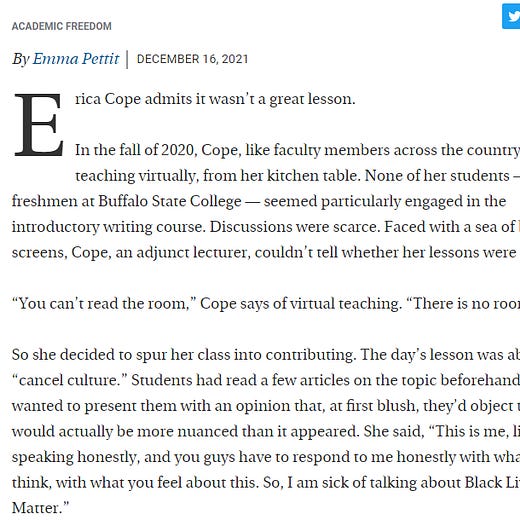E-Pluribus | January 7, 2022
When "inclusion" results in exclusion, the possible downside of increases in philanthropy for social justice, and medical school gets woke.
A round up of the latest and best writing and musings on the rise of illiberalism in the public discourse:
Christopher F. Rufo: The Price of Dissent
At City Journal, Christopher Rufo tells the story of Zac Kriegman, former Director of Data Science for the Thomson Reuters news organization. On more than one occasion, Kriegman ran afoul of social justice and “diversity and inclusion” initiatives at Reuters, and his refusal to conform ultimately cost him his job.
Zac Kriegman had the ideal résumé for the professional-managerial class: a bachelors in economics from Michigan and a J.D. from Harvard and years of experience with high-tech startups, a white-shoe law firm, and an econometrics research consultancy. He then spent six years at Thomson Reuters Corporation, the international media conglomerate, spearheading the company’s efforts on artificial intelligence, machine learning, and advanced software engineering. By the beginning of 2020, Kriegman had assumed the title of Director of Data Science and was leading a team tasked with implementing deep learning throughout the organization.
But within a few months, this would all collapse. A chain of events—beginning with the death of George Floyd and culminating with a statistical analysis of Black Lives Matter’s claims—would turn the 44-year-old data scientist’s life upside-down. By June 2021, Kriegman would be locked out of Reuters’s servers, denounced by his colleagues, and fired by email. Kriegman had committed an unpardonable offense: he directly criticized the Black Lives Matter movement in the company’s internal communications forum, debunked Reuters’s own biased reporting, and violated a corporate taboo. Driven by what he called a “moral obligation” to speak out, Kriegman refused to celebrate unquestioningly the BLM narrative and his company’s “diversity and inclusion” programming; to the contrary, he argued that Reuters was exhibiting significant left-wing bias in the newsroom and that the ongoing BLM protests, riots, and calls to “defund the police” would wreak havoc on minority communities. Week after week, Kriegman felt increasingly disillusioned by the Thomson Reuters line. Finally, on the first Tuesday in May 2021, he posted a long, data-intensive critique of BLM’s and his company’s hypocrisy. He was sent to Human Resources and Diversity & Inclusion for the chance to reform his thoughts.
He refused—so they fired him.
Read the whole thing.
Thomas B. Edsall: The Law of Unintended Political Consequences Strikes Again
The unrest throughout the summer of 2020 following the killing of George Floyd turned out to be a huge philanthropic boon to racial justice oriented organizations. But, Thomas Edsall writes at the New York Times, since such organizations often operate to the left of the general public (even the progressive general public) some Democratic political consultants are concerned the gap between Democrats and their constituencies may actually grow, hurting their causes in the long run.
The killing of George Floyd and the nationwide Black Lives Matter protests that followed drove an exceptionally large increase in foundation grants and pledges to criminal and racial justice reform groups and other causes, ranging from the United Negro College Fund to the Center for Antiracist Research and from the National Museum of African American History to the Yes 4 Minneapolis campaign to dismantle the Minneapolis Police Department.
[…]
Before Floyd’s death, Candid found that philanthropies provided “$3.3 billion in racial equity funding” for the nine years from 2011 to 2019. Since then, Candid calculations revealed much higher totals for both 2020 and 2021: “50,887 grants valued at $12.7 billion” and “177 pledges valued at $11.6 billion.”
[…]
There are Democratic strategists who worry about unintended political consequences that could flow from this surge in philanthropic giving. Rob Stein, one of the founders of the Democracy Alliance, an organization of major donors on the left, argued in a phone interview that while most foundation spending is on programs that have widespread support, “when progressive philanthropists fund groups that promote extreme views like ‘defunding the police’ or that sanction ‘cancel culture,’ they are exacerbating intraparty conflict and stoking interparty backlash.” The danger, according to Stein, is that “some progressive politicians and funders are contributing to divisiveness within their ranks and giving fodder to the right.”
[…]
Michael Tomasky, editor of The New Republic, wrote at the end of November, “It’s an undeniable fact that Democratic Party elites, progressive activists, foundation and think-tank officials, and most opinion journalists are well to the left of the party’s rank and file.”
It’s possible, Tomasky continued, “that certain issues, or ways of talking about certain issues, will be established as litmus tests within the party that could be quite problematic for Democrats trying to run in purple districts.”
Read it all.
Christian Schneider: UNC Med School moves ahead with plans to root instruction in DEI, teach organs aren’t gender-specific
As Pluribus has noted, the medical field is increasingly under pressure to adopt DEI (diversity, equity and inclusion) concepts as guiding principles, at times even overriding scientific and biological reality. Christian Schneider of the College Fix reports that University of North Carolina-Chapel Hill School of Medicine is well on its way to these goals as it helps train the next generation of health care workers.
The new requirement aims to make faculty “see work related to social justice or DEI as central to their work as faculty members,” and their commitment to “anti-racism” would soon be a requirement for advancement through the school.
Among the factors used to determine whether an instructor is sufficiently committed to anti-racism will be anonymous evaluations submitted by students.
The goal set forth by the report recommends 50 percent of departments have evaluation tools that “assess and incentivize a faculty member’s contributions to social justice” in their teaching by 2022, increasing to 100 percent of departments by 2024. Additionally, the school’s Promotion and Tenure Guidelines would have social justice or DEI added as a domain required for promotion for all faculty by 2024.
Further, the medical school has been directed to develop curriculum to train instructors on “implicit bias, the history of discrimination and racism in the US and their relationship to health and health care, and skills to effectively incorporate issues of discrimination based on race/ethnicity, gender, sex, sexuality, nationality, religion, veteran status, socioeconomic status, body size, and other factors” related to teaching.
Read it all here.
Around Twitter
Via Kmele: Henry Louis Gates, Jr. on the preeminence of the pursuit of truth over other concerns:
Via Oliver Traldi, how lack of context can be weaponized in the age of cancel culture:
Wesley Yang responds to The Ivy League’s support (loosely translated: ‘shut up and swim’) for a transgender athlete who is crushing the competition and shattering records on the NCAA women’s swimming circuit:
And finally, Glenn Greenwald finds Congressional Democrats’ embrace of Dick Cheney on the anniversary of the January 6th Capitol riot less than convincing:













